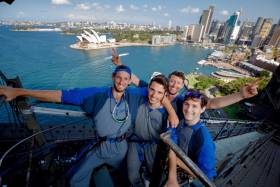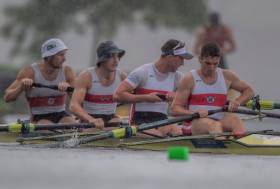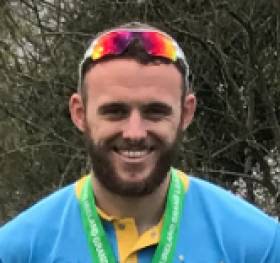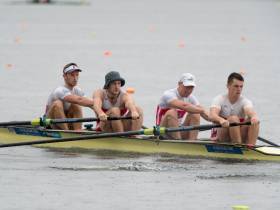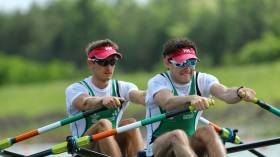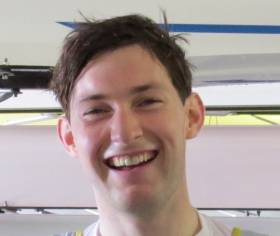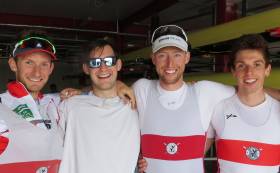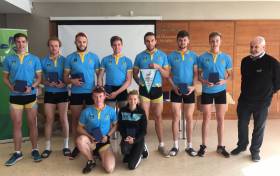Displaying items by tag: Gary O'Donovan
Irish Quartet Rate Highly in Australia
#Rowing: Australian rowing has given a warm welcome to the Irish quartet of Paul O’Donovan and Gary O’Donovan and Shane O’Driscoll and Mark O’Donovan. Rowing Australia says the Irish, who returned from the 2017 World Championships with two gold medals, are “headlining the international line-up” at the Sydney International Regatta next week. The four have been enjoying the sights and climbs of Sydney.
Skibbereen Four Take Premier Medal at New Zealand Championships
#Rowing: An Irish crew have taken a medal in the Premier grade at the New Zealand Rowing Championships. The Skibberen four of Gary O’Donovan, Paul O’Donovan, Mark O’Donovan and Shane O’Driscoll finished third in the Premier four, just a second ahead of fourth.
New Zealand Rowing Championships, Lake Karapiro, Day Five (Irish interest)
Men
Four – Premier
A Final: 3 Skibbereen (G O’Donovan, P O’Donovan, M O’Donovan, S O’Driscoll) 5:58.82.
Murphy Adds Gold in New Zealand
#Rowing: Max Murphy added a gold medal to the silver he had won in the men’s senior pair at the New Zealand Rowing Championships today. The UCD oarsman was part of the Waikato senior eight which were clear winners, beating a crew from their own club into second. Kevin Neville and Eamon Power of NUIG were in the Wellington crew which took bronze.
In warm and calm conditions, Paul O’Donovan and Gary O’Donovan finished fourth in the Premier double sculls, an elite event won by Chris Harris and Robbie Manson.
New Zealand Rowing Championships, Lake Karapiro, Day Four (Irish interest)
Men
Eight – Senior
Final: 1 Waikato (3 M Murphy) 5:56.41; 3 Wellington (7: K Neville; 8 E Power) 6:00.28.
Pair - Senior
Final: 2 Waikato (M Murphy, T Bedford) 6:59.41.
Sculling,
Double – Premier
Final: 4 Skibbereen (P O’Donovan, G O’Donovan) 6:38.66. Senior – B Final: 1 Wairau (2 K Neville) 6:46.04.
Single – Club
B Final: 5 Wairau (E Power) 8:11.15.
Paul O'Donovan and Skibbereen Four Win Place in New Zealand Finals
#Rowing: Paul O’Donovan, in the Premier (open weight) single sculls, and the Skibbereen four both made it to A Finals at the New Zealand Rowing Championships. O’Donovan won in a repechage to join some of the top heavyweight single scullers in the world in the final. Gary O’Donovan took third in the race and will compete in the B Final.
The two brothers joined Mark O’Donovan and Shane O’Driscoll to form a four which won its repechage and will also compete in a final with top heavyweight crews.
Mark O’Donovan and Shane O’Driscoll took fifth in their repechage of the Premier Pair and missed out on the final, while Max Murphy made it through to the A Final of the men’s pair and NUIG’s Kevin Neville and Eamon Power progressed through repechages in the senior single and club single respectively.
New Zealand Rowing Championships, Lake Karapiro, Day Two (Irish interest)
Men
Four – Premier
Repechage Two (First two to A Final; rest to B Final): 1 Skibbereen (G O’Donovan, P O’Donovan, M O’Donovan, S O’Driscoll) 6:21.39.
Pair – Premier
Repechage (Top Four to Final; rest eliminated): 5 Skibbereen (S O’Driscoll, M O’Donovan) 7:11.47.
Senior
Repechage (Top Three to Final): 2 Waikato (M Murphy, T Bedford) 7:33.13.
Sculling,
Single – Premier
Repechage One (First two to Final; rest to B Final): 1 Skibbereen (P O’Donovan) 7:23.32; 3 Skibbereen (G O’Donovan) 7:55.63.
Senior
Repechage Three (First Two to Semi-Final): 2 Wairau (K Neville) 7:29.91.
Club
Repechage One (First Two to Semi-Final): 1 Wairau (E Power) 8:19.07.
Sixth for Skibbereen Men While Murphy Hits Gold
#Rowing: Paul and Gary O’Donovan finished sixth in the Premier Double Sculls Final at the North Island Club Championships on Lake Karapiro in New Zealand today. Earlier, Paul O’Donovan had finished sixth of eight in the Premier Single Sculls, while Mark O’Donovan and Shane O’Driscoll had won the B Final of the Premier Pair.
Max Murphy had a very satisifactory outing. The UCD man, who has been based in New Zealand, took the senior eight and four with Waikato.
North Island Rowing Championships, Lake Karapiro, New Zealand (Irish interest)
Men
Senior Eight – A Final: 1 Waikato (3: M Murphy) 6:19.55.
Senior Four – A Final: 1 Waikato (3 M Murphy) 6:15.01.
Premier Pair – B Final: 1 Skibbereen (M O’Donovan, S O’Driscoll) 6:43.34.
Senior Pair – A Final: 4 Waikato (M Murphy, T Bedford) 6:51.51.
Premier Double Sculls – Final: 6 Skibbereen (P O’Donovan, G O’Donovan) 6:50.76.
Premier Single – A Final: 1 R Manson 6:39.58; 6 Skibbereen (P O’Donovan) 6:54.63. B Final: 3 Skibbereen (G O’Donovan) 6:57.21.
Paul O'Donovan Makes Heavyweight Final in New Zealand
#Rowing: Paul O’Donovan qualified for the Final of the Premier Single Sculls, a heavyweight event, at the North Island Championships in New Zealand today. The Skibbereen man finished second in his repechage, behind New Zealand international Matthew Dunham and ahead of the former world and Olympic champion Mahe Drysdale. All three qualified. Gary O’Donovan finished fourth, one place from qualification.
North Island Rowing Championships, Lake Karapiro, New Zealand (Irish interest)
Men
Senior Four – Heat One: 1 Waikato (W Guest, T Bedford, M Murphy, J Ingham) 6:18.85.
Premier Pair – Heat One (First to Final; rest to repechage): 4 Skibbereen (S O’Driscoll, M O’Donovan) 6:44.25. Repechage One (First Three to Final; rest eliminated): 4 Skibbereen (O’Driscoll, M O’Donovan) 6:41.12.
Senior Pair – Heat One (First to Final): 1 Waikato (M Murphy, T Bedford) 6:50.16.
Premier Single Sculls – Heat One (Winner to Final; rest to Repechage): 6 Skibbereen (P O’Donovan) 7:25.42. Heat Two: 6 Skibbereen (G O’Donovan) 7:28.38. Repechage One (First Three to A Final): 1 M Dunham 7:05.97, 2 Skibbereen (P O’Donovan) 7:07.45, 3 M Drysdale 7:12.51; 4 Skibbereen (G O’Donovan) 7:15.84.
First Outing for O'Driscoll and O'Donovan as Heavyweights in New Zealand
#Rowing: Mark O’Donovan and Shane O’Driscoll competed as a heavyweight pair at the North Island Championships in New Zealand today. The world champions in the lightweight pair, who have switched to heavyweight in the hope of competing at the 2020 Olympic Games in Tokyo, finished fourth in their heat.
Paul O’Donovan and Gary O’Donovan both finished sixth in their heats of the single sculls. Both also competed as heavyweights.
All three boats move into repechages on Sunday.
O'Donovans On Song at Ireland Rowing Trial
#Rowing: Paul O’Donovan and Gary O’Donovan, in a lightweight double scull, tied for the best time with a men’s heavyweight four on the second day of the Ireland trial over six kilometres today. The fastest women’s crew was the four of Tara Hanlon, Emily Hegarty, Aileen Crowley and Aifric Keogh. The double of Claire Lambe and Monika Dukarska were next fastest.
Ireland Trial, National Rowing Centre, Sunday (6 km; selected results):
Men
Four: Shandon/St Michael’s (Murphy, Prendergast, McKeon, Garvey) 21 min 22 sec
Doubles: G O’Donovan, P O’Donovan (lwt) 21:22; R Byrne, S McKeown (hwt) 21:36.
Women
Four: Old Collegians, Skibbereen, UCC (T Hanlon, E Hegarty, A Crowley, A Keogh) 22:54.
Double: M Dukarska, C Lambe (hwt) 23:12; D Walsh, A Casey (lwt) 23:35
UCD Celebrate 100 Years in Style
#Rowing: The UCD Boat Club centenary dinner was a huge and successful occasion, with 425 attendees. Tom Sullivan (81) was the keynote speaker and gave a summation of the history of the club: not just the good days, such as the 1974 win in the Ladies Plate at Henley Royal Regatta (he was the coach), but also the tough times early on, when one of the mentors, James Meenan, said that “championships were not for the likes of us”.
Sullivan was not the only one who could look back to the middle of the last century and revel in the successes. Michael Cleary (91) rowed in the late 1940s and early 1950s. He received a special award.
Ten other presentations were made to important figures in the history of the club.
UCD Centenary Awards
Liz Cooke, Colm Daly, Johnny Devitt, Martin Feeley, Claire Lambe, David Neale, Murrough O’Brien, Jaye Renehan, Brian Sherry, Tom Sullivan.
Good Placing for Ireland Internationals in London Fours Head
#Rowing: A quadruple featuring three Ireland lightweight internationals finished 15th at the Head of the River Fours in London. Gary O’Donovan, Shane O’Driscoll and Mark O’Donovan joined Niall Kenny in the Tideway Scullers’ crew. They had serious equipment problems which affected their steering from early in the race.
Head of the River Fours, London (Irish interest): 15 Tideway Scullers’ School E 20 52.2



























